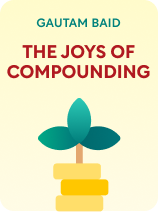

This article is an excerpt from the Shortform book guide to "The Joys Of Compounding" by Gautam Baid. Shortform has the world's best summaries and analyses of books you should be reading.
Like this article? Sign up for a free trial here.
What’s the lifelong learning concept? Why should you always be continually learning?
Just like an artisan hones their skills over time to master their craft, continual learning will sharpen your mind. It also fuels personal and professional growth and helps you adapt to life’s evolving challenges.
Let’s dive deeper into the concept of lifelong learning.
Engage in Continual Learning
In The Joys of Compounding, Gautam Baid offers suggestions for embracing the lifelong learning concept in your everyday life:
Schedule learning time: Find time for acquiring new knowledge or honing your skills by eliminating unproductive tasks that don’t contribute to your growth or well-being.
(Shortform note: In addition to eliminating unproductive tasks, consider cutting unnecessary decisions to make time for learning. Neil Pasricha (The Happiness Equation) says that you waste a vast amount of time on unnecessary decisions—according to research, the average adult makes 35,000 decisions a day, equating to over 2,000 decisions each waking hour, or 34 decisions each minute. Pasricha suggests you write down all of the decisions you make in a day and consider which ones don’t increase your happiness or contribute to your goals. Then, come up with ways to remove the necessity of these decisions. For example, deciding to eat the same breakfast every day saves time and energy each morning and every time you go to the store.)
Explore diverse disciplines: Study a variety of fields to draw insights from different knowledge domains. This will expand your perspective and enrich your problem-solving skills. (Shortform note: In addition to expanding your knowledge, this tactic boosts dopamine levels, increasing your motivation to learn. Steven Kotler (The Art of Impossible) explains that studying a variety of fields every day feeds your brain a continual stream of information while giving it time to naturally make connections between what you already know and what you’re learning. This act of bridging old and new knowledge fosters insightful breakthroughs that stimulate the release of the reward neurochemical dopamine, heightening your motivation to learn more.)
Read regularly and extensively: Explore a wide array of subjects to expose yourself to diverse perspectives. Employ active reading techniques, such as annotation, to deepen your comprehension and enhance memory retention.
(Shortform note: According to Barbara Oakley and Terrence Sejnowski (Learning How to Learn), employing active reading techniques across diverse subjects expands your knowledge by helping you establish mental connections with other topics. They suggest you can enhance your understanding and retention by adapting the way you engage with the content: For factual information, try reciting or writing the facts down from memory; when reading about a problem-solving method, actively work through a problem using that approach; and if you come across a hands-on skill, take the time to practice it.)
Learn from successful people: Identify people who inspire you and study their experiences to gain valuable insights and accelerate your personal development. You can do this by reading biographies of great thinkers or connecting with individuals you know and admire.
(Shortform note: Podcaster and author Tim Ferriss advocates this approach, suggesting that learning about and emulating the habits and beliefs of successful people can lead you to success too. In Tools of Titans, he shares the habits and beliefs of 101 high-performers, from tech investors and entrepreneurs to athletes and entertainers. Ferriss advises that whether you’re reading his book, other success-oriented books or biographies, or connecting with successful individuals, the key to maximizing your personal growth is to identify and actively incorporate the insights that resonate most with you.)
Practice fundamental reasoning: Deconstruct complex concepts to their essence to understand how they apply and why they matter. For example, understand chemical reactions by grasping the fundamental principles of why and how molecules interact.
(Shortform note: Edward B. Burger and Michael Starbird (The 5 Elements of Effective Thinking) emphasize that fundamental reasoning prevents misconceptions, ensuring a solid grasp of complex subjects. For example, with just a basic knowledge of the stock market, you might assume that rising stock prices indicate strong companies, which isn’t always the case. To avoid such misconceptions, delve into the fundamental principles behind stock valuations and market forces to understand the intricate dynamics influencing market movements.)

———End of Preview———
Like what you just read? Read the rest of the world's best book summary and analysis of Gautam Baid's "The Joys Of Compounding" at Shortform.
Here's what you'll find in our full The Joys Of Compounding summary:
- Why compounding isn't just a financial concept, but a transformative principle
- Strategies for compounding your well-being and happiness
- How to achieve steady and sustainable financial growth






